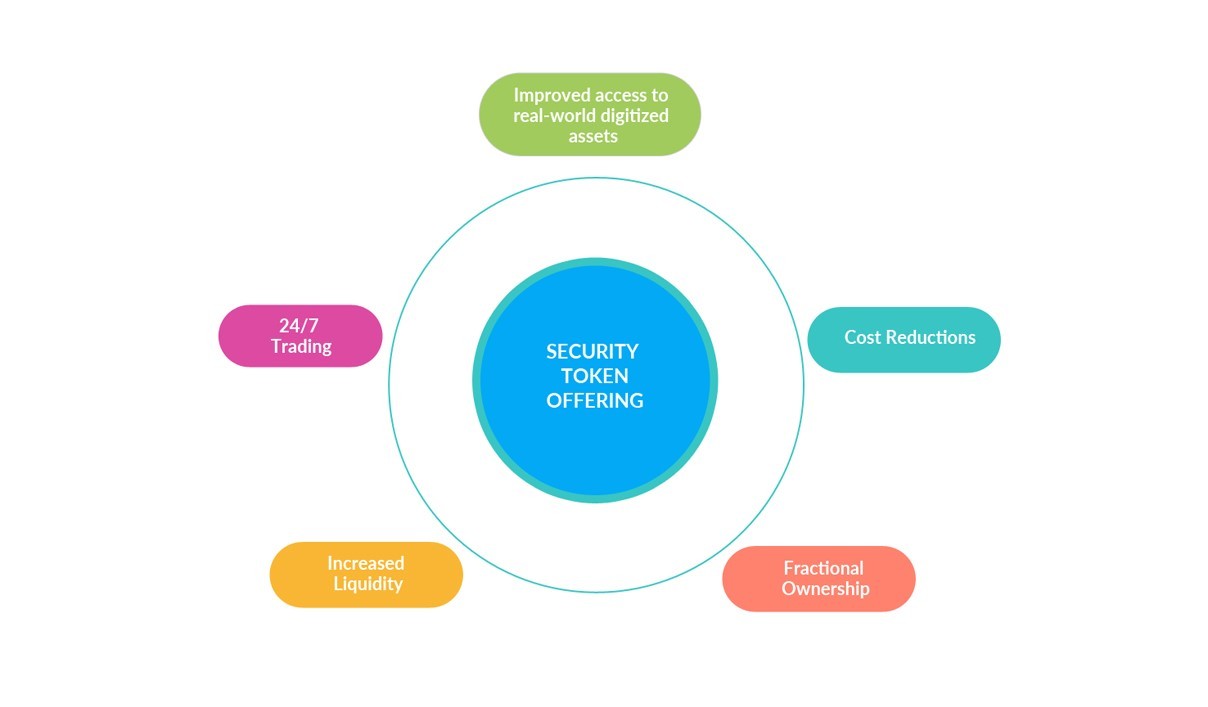Security token offering are financial securities backed by tangible assets, revenues of the company or profits. Security token offering (s) offer legal rights like revenue distribution or voting. The role of a security token is similar to that of conventional security, except that it verifies ownership through blockchain and makes fractional ownership possible. Security tokens protect investors without the involvement of a third party using smart contracts. We will discuss how money can be raised via Security Tokens, in adherence to U.S. laws, for Real Estate projects.
So, what is Security Token Offering?
In finance terms, security is a certification that has some intrinsic monetary value. It can either be traded by exchanges who brokers the transaction or traded directly from peer-to-peer. The securities are mainly classified into 2 main categories: Equity & Debt.
Security tokens are cryptographic tokens that can be paid to the owner as dividends, a share of profits, interest amount or can be used to invest into other security tokens. Companies utilize these methods to raise capital from investors, to fund some parts of businesses like expansion plans. The financiers are offered to make a profit through means like interest rates, share on the company profits or dividends.
Future of finance
Keeping the benefits of security tokens in mind, many corporate giants have built platforms to trade security tokens and provide institutional investors with an easy and secure way to start investing in blockchain technology. Security tokens have the potential to offer investors the security of a regulated instrument combining agility and the speed of blockchain.
As security token offerings need to comply with the SEC’s rules and regulations, it means security tokens have to incorporate many more legal contracts. Around $256 trillion of real-world assets exist in the world and associating them to the investors through blockchain could bring a massive change in the financial markets.
What impact can regulations bring to the Security Token Offering?
Security tokens are investment contracts which are sold with the expectation of future returns for its holds covered by securities laws.
The laws may vary from country to country; therefore, companies need to make sure that all regulatory requirements are met before soliciting funds from investors.
The USA and Switzerland took the initiative to become the first countries that have legitimized the tokens. It is believed that 2018 was a year when cryptocurrency started to mature. As a result, the U.S. Securities Exchange Commission also began an investigation on crypto organizations and the nature of tokens.
As a consequence, companies started filing the SEC’s Form D to launch an STO. Raising funds via STO is compliant with the legal regulations, allowing crypto ventures to sell security tokens to large organizations. Being a federal government agency, SEC has to protect investors, maintain ordered and fair functioning of the securities market and facilitate capital formation. As per the Federal Securities Law, no company can sell or issue security tokens without the registration in the SEC. To be called as a security token, it needs to qualify a Howey Test.
Howey Test
The Howey Test, established by the US Supreme Court, determines whether a transaction represents an investment contract or not. The following conditions must be met for a transaction to be considered as an investment:
- It is a money investment.
- Profits are expected from the investment.
- Investment of money should be within a common enterprise.
- Profit comes from the efforts of a promoter or third party.
Federal courts define a common enterprise as an organization where investors can pool assets or money together to invest in any project. A part from the Howey Test, there are many other legal regulations which should be met when launching a security token.
STO Regulations
Security tokens are compliant from the initial stage as they are subject to certain federal security regulations.
Security tokens in the USA need to adhere to the following regulations:
Regulation D: Regulation D is a Securities and Exchange Commission (SEC) regulation which allows startups or smaller companies to raise funds through debt securities or the sale of equity without the need of registering securities with SEC. It is required for companies to file a Form D with the names and addresses of their directors and executives and some details related to the offering.
Regulation S: Regulation S offers an SEC compliant method for non-US and US companies to raise funds outside the USA. A US-based company does not need to use Regulation S. The offering subjected to this regulation can issue both debt and equity securities. The creators should follow the security regulations of the country where they can be executed.
Regulation A+: Regulation A+ allows the creator to provide SEC-approved security to non-accredited investors via a general solicitation for up to an investment of $50 million. With regulation A+, the US or Canadian companies can combine public funding with private funds from venture capitalists for creating a large round of fundraising.
Real Estate Security Tokens (RESTs)
The emerging Real Estate Security Token (REST) ecosystem has been experiencing steady growth and development this year. When an asset owner decides to tokenize a property, one approach is an Ethereum-standard (ERC20) real estate token (also called a security token) is created to represent shares of the property. The total value of all tokens will be equivalent to the total value of the securitized asset.
Let’s look at an example: Suppose you want to tokenize a 100,000 sq ft property that’s worth $30M. A simple way to divide the property into shares is to offer one share for every square foot. So, you would divide the property into 100,000 shares, each representing one square foot of the property and valued at $300. Alternatively, you could divide the property into square inches, in which case each token would be worth $2.08. You might choose this option to make your project accessible to a wider range of investors. Of course, you could also choose to limit the share offering to a certain percentage of the asset – say 20%, to retain majority ownership while raising funds.
Once tokens are created, they are then ready to be sold to investors. Therefore, the tokens need to be listed on an exchange so investors can trade. There are not many listing options, but you want to choose one that have a lot of registered investors on the platform and a mature history of facilitating STO transactions. Also, keep in mind that a single token can be listed on multiple exchanges.
Conclusion
When Security Token Offerings become more mainstream and mature, it will give strong competition to banks.
Avoiding high interest loans from banks, and provide opportunities for individual investors to buy into big real estate projects can be a win-win for all parties.
Disclaimer: This material has been written for informational purposes only, and is not intended to provide, and should not be relied on for, tax, legal or accounting advice.





